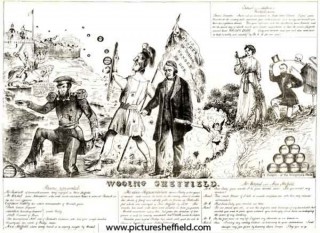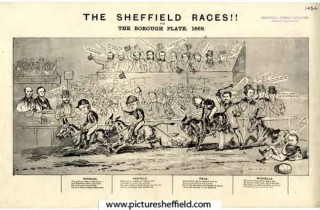Rev. Stainton's Political Life ~ Part 6
Sheffield & Rotherham Independent ~ September 21st, 1868
Transcribed by Niv C.
Rev. Stainton supported Mr. Mundella in his candidature for the election in 1868. There were multiple meetings and campaigning held in the city of Sheffield.
His candidature and campaign signified the transfer of power back in the hands of working men and gave the opportunity to these men to throwback the stigma that had been fixed on them and declare them being the friends of the employers.
The 1868 article below gives details on one of the meetings held before Mundella’s candidature in the election.
MUNDELLA’ S CANDIDATURE- Meeting of Committees
“On Saturday evening a meeting of committees formed to promote Mr. Mundella’s candidature was held last night at the Railway Spring Makers’ Room, Newhall street. Mr. Askham was voted to the chair, and he said it spoke well for the spirit of the committees that so many were present almost to the minute. He took it for granted that the matter they were engage in was one of the greatest things that had interested Sheffield for many years past. Political power was now given into the hands of the working men, and it was for the working men of Sheffield to throw back once for all the stigma that had been fixed on them, to declare that they were the friends of the employers, and to set an example to those who ought to know better than they the action which the town should take in this important crisis. He congratulated them, and should never cease to do so, on the choice they had made, in asking Mr. Mundella to stand for Sheffield. (Cheers) Some of them knew that for many long years as a manufacturer he had been striving to find out the very thing Mr. Mundella had done, staving off turnout and meeting the difficulty without spending money and creating ill-feeling. It was more especially on this point that he (the chairman), as one of the manufacturers of Sheffield, was glad of the opportunity to help the working men and support Mr. Mundella. He believed they were going to set an example to the whole country, for he took it for granted that Mr. Mundella was as sure to be elected as if he were already elected. (Cheers) He had something to do with working men himself- but let him be understood, he had not been bringing mind to bear upon mind-(hear, hear)-he had only heard what some of his workmen had voluntarily told him. That night he said to one table-blade grinder, “George, how is it going?” “Well,” he said, “you may depend it is all settled.” He asked, “What do you mean?” “Oh,” he said, “it’s all going one way; I can’t find any one at all who is not for Mundella.” He hoped they would soon reckon their friends by heads and names; it would not do to guess because they met friends in the street who made statements to them. Nor would it do to under-estimate the strength of their enemies, for they were strong, and had intelligence, influence, and great wealth, and had at their head a man who stood in the fore-front, a sharp witted felloe whatever they might say against him, who knew how to turn a corner just as quickly as anybody, and who would stop at nothing that seemed to favour his election. (Hear, hear) Well, they must have the names of their supporters, for he was satisfied, so far as he could gather from the working men who had voluntarily given him their estimate of the thing, that they had the great bulk of the men of hard hands and strong arms in the town of Sheffield. (Hear, hear) At some of their opponents’ meetings they asked, “Are there any black sheep among you?” But he would not ask that, for if there was a man there who was a Roebuckite, let him stop. Theirs was the popular cause, and they wanted everybody to hear and judge for himself, being satisfied that all who went to hear would go away friendly. Therefore he said, “Stop here and judge for yourselves.” The chairman concluded by stating that as this was a committee meeting held for business purposes, in which each one should speak his mind with the utmost freedom, it was not desirable that it should be treated as an open meeting. The reporters thearefore retired. We are enabled to add that each Ward Committee was then called upon to report, and their returns were in the highest degree encouraging and satisfactory.
Mr. Mundella, the Rev. R. Stainton, and the Chairman afterwards briefly addressed the meeting, which w full of enthusiasm and good feeling, and the members of the various committees separated to pursue with renewed zeal their labours.”
References:











No Comments
Add a comment about this page